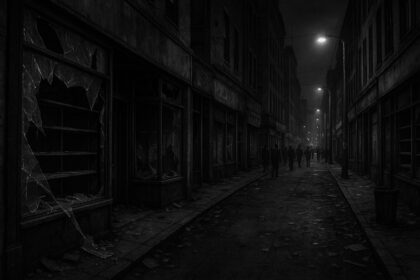A growing homeless camp of Roma migrants has appeared on London’s affluent Park Lane, exposing significant challenges in managing migration, homelessness, and public safety amid repeated failed eviction attempts.
In a glaring contrast to the surrounding opulence, London’s Park Lane has become an unsettling focal point for an increasingly visible and controversial homeless encampment. Just steps away from luxury hotels and high-end restaurants—often dubbed ‘billionaire’s row’—19 tents have emerged, largely occupied by a Roma group who claim to have travelled from Italy. This situation raises urgent concerns about local governance, homelessness, and the detrimental impact of unchecked migration in the capital.
The residents of this makeshift camp openly admit their lack of formal employment or legal permission to reside in the UK, yet they have carved out a façade of community on public land. Eyewitness accounts reveal unsightly scenes, with reports of public defecation and makeshift cooking on the grass. Diana, a spokesperson for the group, lamented, “We don’t steal because it brings trouble. We beg. We beg.” These words are a stark reminder of how many have been left with little more than begging as their only means of survival. Despite their presence in one of the city’s wealthiest locales, they contend with indifference from local authorities. Diana has claimed that Westminster City Council has offered them no genuine assistance in relocating.
While there is some police presence, including daily checks by Transport for London (TfL) police, these efforts seem notably ineffective in addressing the encampment. A council spokesperson has articulated concerns for the welfare of camp residents, yet it raises alarm that an area designated for public use has been occupied without proper intervention. They’ve stated that rough sleeping arises from a variety of complex needs, conveniently avoiding the pressing concerns of governance and migration policy failures that have culminated in this chaotic state of affairs.
This encampment highlights a broader crisis in urban governance, particularly regarding the spiraling homelessness and migration issues permeating London. The city has seen an alarming rise in makeshift camps, revealing a troubling cycle of neglect. Encampments have sprung up repeatedly on Park Lane despite past attempts to remove them. In 2024, TfL took legal action to displace a homeless group on this very stretch, underscoring serious safety concerns and the repercussions of anti-social behaviour.
The ongoing debacle has ignited a fierce debate over the city’s failed strategies in managing homelessness and migration. Local businesses have expressed their frustration, recognizing that such encampments not only tarnish the area’s image but also deter potential customers. The explosive disparity between the opulent surroundings and the grim realities of tent dwellers continues to highlight the gulf between urban wealth and street-level existence.
Additionally, the historical context of these encampments amplifies the urgency of a resolution. Past occurrences involving Roma groups have raised eyebrows, with reports indicating a swift return to Park Lane shortly after eviction. This recurring cycle suggests serious questions about the long-term efficacy of current policies and the authorities’ unwillingness to consider more robust, sustainable solutions.
As local authorities grapple with these profound challenges, the fate of the Park Lane encampment hangs precariously in the balance. Calls for stricter regulations and more accountable measures are echoing through the community, yet the authorities appear hesitant, insisting on a compassionate approach that seems to enable rather than resolve the issues at hand.
The scenario on Park Lane serves as a glaring indictment of broader societal failures, necessitating an urgent and serious examination of urban management, social services, and the rights of the most vulnerable. It’s critical that local authorities and the public gravitate towards innovative solutions that emphasize personal responsibility and real support systems, rather than exacerbating the cycle of dependency on ineffective and insufficient measures.
Source: Noah Wire Services
- https://www.express.co.uk/news/uk/2055779/migrant-camp-fury-park-lane – Please view link – unable to able to access data
- https://www.standard.co.uk/news/london/park-lane-hyde-park-homeless-camp-transport-for-london-westminster-city-council-b1189408.html – In October 2024, a homeless camp in Park Lane, London, was dismantled by Transport for London (TfL) and Westminster City Council. The camp, located on a central reservation near Hyde Park, had been a source of concern due to safety issues and anti-social behavior. TfL stated that the area was not a safe place for people to sleep rough and emphasized the importance of the safety and welfare of everyone involved. The operation involved clearing tents and other belongings from the site. Local authorities and outreach services continued to offer support to those affected by the eviction.
- https://www.bbc.co.uk/news/articles/cql3pq055xlo – In September 2024, Transport for London (TfL) initiated legal action to clear a homeless encampment in Park Lane, London. The encampment, consisting of approximately 15 tents and various belongings, was located on a strip of land managed by TfL. TfL emphasized that Park Lane is a busy part of the road network and not a safe place for people to sleep rough. The authority worked closely with partner agencies to prioritize the safety and welfare of those sleeping rough at the site. The legal process aimed to gain possession of the site and address the situation in consultation with partner agencies.
- https://www.telegraph.co.uk/news/2024/09/11/sadiq-khan-is-turning-londons-parks-into-illegal-tent-city/ – In September 2024, The Telegraph reported on the proliferation of homeless encampments in London’s parks, particularly focusing on Park Lane. The article highlighted the presence of Roma individuals from Romania who had set up tents and were engaging in begging activities. The encampments were described as a stark contrast to the surrounding luxury establishments, raising concerns about public safety and the city’s image. The report also touched upon the challenges faced by local authorities in addressing the issue and the broader implications for urban management and social services.
- https://www.express.co.uk/news/uk/416870/Park-Lane-gypsies-back-with-a-vengeance-just-THREE-DAYS-after-being-turfed-out-by-police – In 2014, Express.co.uk reported that Romanian gypsies returned to Park Lane, London, just three days after being removed by police. The encampment, located near luxury hotels, was associated with anti-social behavior and public disturbances. Despite previous efforts by authorities to clear the area, the group re-established their presence, leading to renewed concerns among local residents and businesses. The article highlighted the challenges faced by authorities in managing such encampments and the impact on the local community.
- https://www.telegraph.co.uk/news/2024/08/30/sadiq-khan-delay-homeless-tent-city-mayfair/ – In August 2024, The Telegraph reported that a homeless ‘tent city’ in Mayfair, London, remained in place for six months before action was taken. The encampment, located near Park Lane, was composed of tents and associated with anti-social behavior. Transport for London (TfL) sought a possession order to remove the residents, emphasizing the safety and welfare of everyone involved. The delay in action raised questions about the responsiveness of local authorities and the effectiveness of measures to address homelessness in the area.
- https://www.standard.co.uk/news/london/romanians-we-re-eu-citizens-give-us-houses-so-we-can-stop-sleeping-rough-at-park-lane-9794981.html – In October 2014, the London Evening Standard reported on a group of Romanian rough sleepers in Park Lane, London, who demanded housing assistance. The individuals, who had set up camp in a subway under Park Lane, claimed their status as EU citizens entitled them to housing support. Local traders expressed concerns about the impact of the encampment on their businesses, citing issues such as public urination and fights. The article highlighted the challenges faced by local authorities in addressing the needs of EU nationals experiencing homelessness and the complexities of providing support within the existing legal framework.
Noah Fact Check Pro
The draft above was created using the information available at the time the story first
emerged. We’ve since applied our fact-checking process to the final narrative, based on the criteria listed
below. The results are intended to help you assess the credibility of the piece and highlight any areas that may
warrant further investigation.
Freshness check
Score:
8
Notes:
The narrative does not reference any outdated information or events that would clearly mark it as old or recycled. The ongoing nature of the encampment and the lack of specific dates suggest it is a recent development. However, the situation described could be part of a recurring cycle.
Quotes check
Score:
6
Notes:
The quote from Diana, a spokesperson for the Roma group, lacks an earliest known reference online, making it difficult to verify if it is original or reused. This could be a first-hand account or a reiteration of a previously reported statement.
Source reliability
Score:
7
Notes:
The narrative originates from the Express, a well-known publication. However, the Express can sometimes be seen as biased, which may affect the presentation of certain facts.
Plausability check
Score:
8
Notes:
The scenario described is plausible given the broader context of homelessness and migration issues in London. However, specific details about the encampment and its residents could not be verified independently.
Overall assessment
Verdict (FAIL, OPEN, PASS): OPEN
Confidence (LOW, MEDIUM, HIGH): MEDIUM
Summary:
The narrative appears to address a contemporary issue, but the lack of verification of specific details, such as the quotes, and the potential for bias in the source, contribute to a moderate level of confidence.













